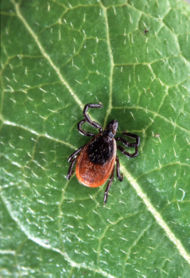 As I was walking our dog down a country road in Western Massachusetts this morning, I was thinking about how taming the wilderness is such a natural human impulse.
As I was walking our dog down a country road in Western Massachusetts this morning, I was thinking about how taming the wilderness is such a natural human impulse.
I’ve been unsettled by the disease-carrying deer ticks our dog keeps bringing into the country house, and I was longing for the seeming civility of Brooklyn again where the kids and I will return in 10 days. But at home, we’ve had sugar ants in the kitchen, mice fleetingly in the pantry, and a recent confined case of bed bugs (which I introduced by buying an antique mahogany bed off Craigslist). Quite a year for a chattering mom who loves Feng Shui, peace, and tranquility!
Why all the pests? I’ve been asking myself that. There seems to be no co-existing with these menaces.
So this morning, as I walked in the country, I pretended to be an early settler in the wilds of East Coast America, and I tuned in to how desperately the pilgrims must have desired to dominate and civilize the wild earth.
Who wouldn’t? In those days, if you didn’t try to contain nature, you ran the risk of seeing it kill you. Who wouldn’t quickly build four walls, good roads, reliable vehicles to carry you to faraway places? Who wouldn’t rape the planet, develop harsh chemicals, do whatever you’ve got to do over a series of generations, to keep your family healthy and safe?
Today, we’re being asked to get conscious of our relationship to nature. We are not superior to the earth, we are part of it, made of “the same hydrogen atoms,” says Sister Miriam McGillis, a nun and environmentalist who lives and teaches at Genesis Farm. In our well-intended effort to tame nature and capitalize on its goodness, we’ve corrupted it, done serious damage, taxed it in a way that will make it turn on us if we don’t stop.
In couples counseling, people often realize that they’ve turned what they initially loved about their partner into a character flaw they can’t abide anymore. You might fall in love with someone who seems optimistic and lighthearted, and then you realize you resent how carefree they are in stressful times, that they are, in fact, avoiding something.
So as I digressed from being a pilgrim, to having my own counseling session with Mother Nature on my walk this morning, I realized that what I most love about the country is ITS WILDNESS. I just adore it. But here I am battling against it, engaged in ongoing nontoxic combat with the black flies and deer ticks, putting a lot of energy into hating all pests, resisting the wildness of nature! Oh, this is too much, I was thinking today, I should just bring out the fricking DEET and be done with it. They should shoot all the deer out here to get rid of the deer ticks.
But it’s not in me to ever bring out the DEET, leaving it in my imagination as a last nuclear war resort. And of course, how awful the world would be without deer!
So now, I’m just sitting with all of this.
I guess, bigger than just a treatise on pests, this blog post is a modest lesson in one chattering mind’s suffering. Events, illness, change descend; they all invade our peace, but perhaps we can learn to preserve our wellbeing in spite of it all. Relation to spirit, a motivation to contemplate hidden meanings, an ability to find small spots of peace within, these practices might help us contend with life’s randomness and all the pests that come as part of the program.
Any thoughts, anyone? Pests (metaphoric or actual) got you down?
More from Beliefnet and our partners

